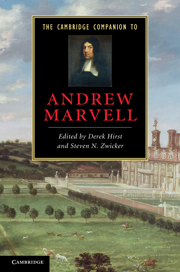Book contents
- Frontmatter
- 1 Introduction
- 2 The social modes of Marvell’s poetry
- 3 Marvell and the literary past
- 4 Borders and transitions in Marvell’s poetry
- 5 Thinking of gender
- 6 Marvell and the designs of art
- 7 Andrew Marvell’s citizenship
- 8 The green Marvell
- 9 A Cromwellian centre?
- 10 The poet’s religion
- 11 Adversarial Marvell
- 12 How to make a biography of Andrew Marvell
- Index
- Cambridge Companions to. . .
1 - Introduction
Published online by Cambridge University Press: 28 March 2011
- Frontmatter
- 1 Introduction
- 2 The social modes of Marvell’s poetry
- 3 Marvell and the literary past
- 4 Borders and transitions in Marvell’s poetry
- 5 Thinking of gender
- 6 Marvell and the designs of art
- 7 Andrew Marvell’s citizenship
- 8 The green Marvell
- 9 A Cromwellian centre?
- 10 The poet’s religion
- 11 Adversarial Marvell
- 12 How to make a biography of Andrew Marvell
- Index
- Cambridge Companions to. . .
Summary
The making of a Cambridge Companion to Andrew Marvell is a more likely enterprise in 2010 than it would have seemed in the late 1980s when Cambridge Companions to individual authors began to appear. Most obviously, the state of Marvell studies has been transformed by new editions of Marvell’s poetry and of his polemical writings; we have a more informed appreciation of Restoration politics and religion and of how to track Marvell’s presence in those fields; and we have a more finely grained understanding of writing culture, of manuscript and of print. That culture was formed not only of individuals who might have thought of themselves as authors but also of communities that had, in some sense, authorial function – patronage circles, coteries of wit, of partisan affiliation, of spiritual affinity, of gender or perhaps of sexual identity. And in that emerging complication of authorship lies a more fundamental distinction of this moment. The very category of author as subject of study was in the 1980s in some dispute; it had of course been challenged by Foucault’s deconstruction of authorship, but now new historicists and cultural materialists were dispersing authorial agency into a broader circulation of social and cultural energy, while discourse analysis of various kinds further complicated the notion of authorship. More broadly too, historians had replaced the old ‘history of great men’ with a new social history of otherness and dissonance. But from that direction, paradoxically, came an impulse to recover authorship.
- Type
- Chapter
- Information
- The Cambridge Companion to Andrew Marvell , pp. 1 - 7Publisher: Cambridge University PressPrint publication year: 2010

